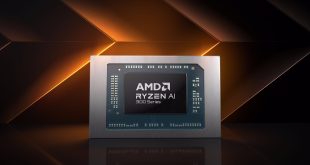Advanced Micro Devices faces hard times these days as sales of its central processing units and graphics processing units have been hitting new lows for many quarters. As a result, rumours about possible acquisitions of AMD resurrect.
Samsung Electronics, the world’s largest maker of semiconductors, is considering to acquire Advanced Micro Devices to better compete against Apple, Intel Corp., Nvidia Corp., Qualcomm and other rivals, reports Hankooki. The takeover could be beneficial for both AMD and Samsung, but there are many roadblocks for the merger.
Samsung Electronics is one of the largest companies in the world with interests in many industries. The company has installed semiconductor production capacity of around one million 300mm wafers per month, which is considerably more than Intel and TSMC combined. In a bid to differentiate on the market of smartphones, PCs, wearable electronics and various emerging devices like smartglasses or virtual reality headsets, Samsung needs its own intellectual property, such as microprocessors, graphics processing units and so on. The company has around $56 billion in its pockets just for acquisitions, it can afford almost any fabless developer of chips.
Advanced Micro Devices has been trying to reinvent itself for years, but so far without a lot of luck. The company’s revenues have been decreasing steadily for years, just like research and development budgets. As a consequence, it gets increasingly hard for AMD to compete against Intel and Nvidia Corp., two of its arch-rivals on the markets of CPUs and GPUs.

AMD licenses the x86 instruction set as well as a number of other vital microprocessor technologies from Intel. Under the terms of the cross-licensing agreement between the two companies, control over either companies cannot be changed. Once AMD or Intel is acquired by a third party, the pact is automatically terminated and the new owner will have to renegotiate it, or stop to make x86 or x86-64 central processing units (depending on which of the two is acquired).
It is not the first time when rumours about AMD acquisition by Samsung, Oracle and other potential buyers emerge. Earlier this year it transpired that Advanced Micro Devices could be acquired by Chinese BLX IC Design Corp. Then, it was reported that China’s Loongson Technology, a microprocessor manufacturer controlled by BLX IC Design, the Chinese Academy of Sciences and the Institute of Computing Technology, was set to make strategic investments in AMD’s technologies and product lines.
AMD and Samsung did not comment on the news-story.
Discuss on our Facebook page, HERE.
KitGuru Says: AMD has a lot of intellectual property that would fit Samsung perfectly. Unfortunately for the latter, to build x86 microprocessors it needs a license from Intel, which is something the company of Samsung’s size will hardly get. On the other hand, does Samsung need x86 at all? Clearly yes, if it wants to compete against Intel on the market of microprocessors for PCs and servers. But what if Samsung simply needs an excellent CPU and GPU development teams along with IP to create chips for its smartphones, tablets, wearables and so on? If this is the case, an ARM license is more than enough…
 KitGuru KitGuru.net – Tech News | Hardware News | Hardware Reviews | IOS | Mobile | Gaming | Graphics Cards
KitGuru KitGuru.net – Tech News | Hardware News | Hardware Reviews | IOS | Mobile | Gaming | Graphics Cards




The same rumor has been going on for over 5 years, while also Dell has been trying to cut a deal for AMD. The truth is, while AMD will benefit more from Samsung’s pockets, I do think they will move from their current model, since AMD has unsettled patents with Nvidia, and lots of common pattents with Intel, one of the biggest rivals of Samsung on the market.
What Samung is really after with such a deal is to get all the equipment, patents and manpower, rather than the brand itself.
“AMD licenses the x86 instruction set as well as a number of other vital microprocessor technologies from Intel.”
Yes its all intel. Sure it is? And the Itanium was a succes? Why does it say amd64!?
Who Am i!?
If this DID happen, and they make parts as well as they make phones, then Intel and Nvidia have finally won.
Read the cross license agreement http://www.sec.gov/Archives/edgar/data/2488/000119312509236705/dex102.htm and then you will see why AMD also uses Intel’s MMX, SSE, SSE2, SSE4 and AVX extensions. Also Itanium was a joint project between HP and Intel for HP’s custom database servers: http://semiaccurate.com/2013/02/11/hp-and-intel-effectively-kill-off-itanium/ and the only Itanium customer was HP themselves. Meanwhile the rest of the world is using Xeons.
The rumor was created due to the “lost in translation” effect. The article actually says that industry insiders were saying that acquisition of AMD would be beneficial to Samsung (based on Samsung’s own statement back in 2007) as the company does not have other tehcnologies (outside of Samsung’s own chips) to stand should-to-shoulder with giants like Intel and Qualcomm. However that article does not say that Samsung is interested in acquiring AMD, or rather currently has no interest in AMD yet. You can see a hint of that on the last paragraph.
joint HP/intel project ?! Another intel insider/lackey lying through his teeth like a politician trying to rewrite history. Itanium is a rebrand of DEC IP, after compaq bought DEC and then HP bought compaq. Compaq gave intel DEC’s IP, state of the art at that time (before intel had learnt to count up to 64) and the morons at intel didn’t have a clue what to do with it. THAT is why itanium failed- outside of scaling x86, the morons know NOTHING, period, NOTHING.
The Itanium was in fact was a true 64-bit RISC CPU, and not a x86 CPU. As mentioned earlier, Itanium was jointly developed by HP and Intel: http://www.chiplist.com/Intel_Itanium_processors/tree2f-chapter–14-/21.0.0.0/ quotes…
“Initiated by HP in 1990 (code name PA-WideWord, PA-WW), jointly developed by Intel and HP from 1993, originally as a follow-up to their respective X86 and PA-RISC processors. Other processors that would be obsoleted by Itanium were DEC/Compaq Alpha and SGI MIPS.”
And that PA-RISC was HP’s design as well: http://www.openpa.net/pa-risc_processors.html quotes…
“The PA-RISC platform is based on RISC processors from HP and was used in HP computers from the 1980s until the early 2000s.”
Would it not hurt Intel a good deal to lose the x64 license. I would think that leverage would make negotiations go rather smoothly.
If nothing else, this would be awesome because now all of AMD’s desktop GPUs will come with high quality Samsung VRAM and not the piece of garbage Elpida that many Radeon customers get stuck with.